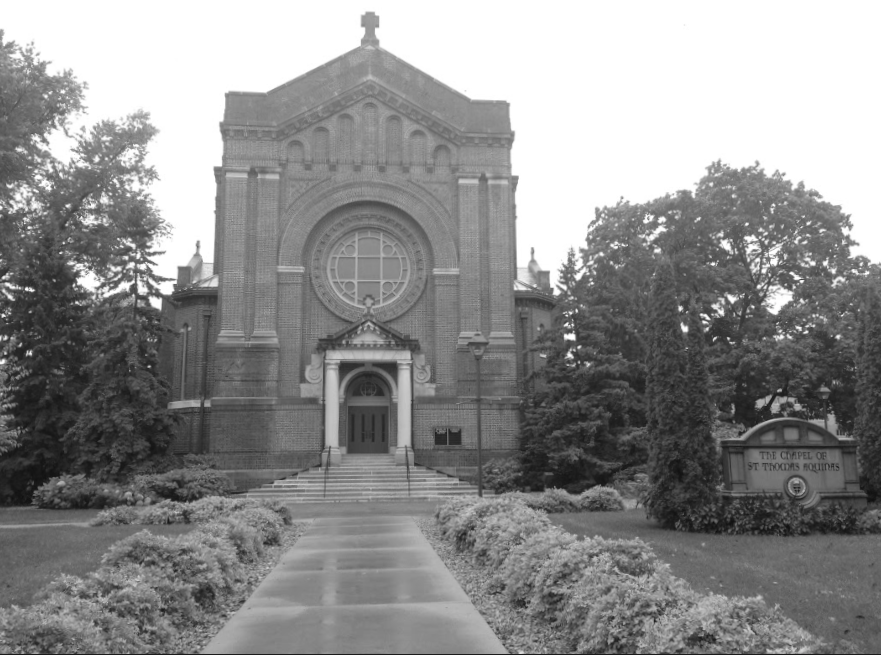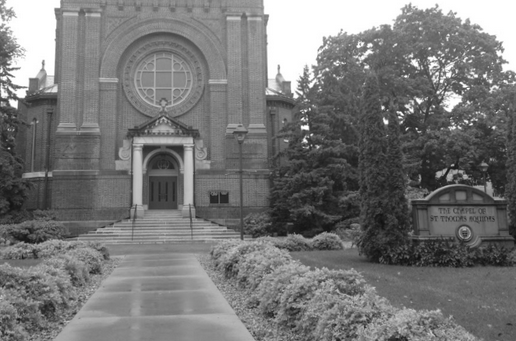
I grew up attending Catholic schools all my life, but that’s not why I chose St. Thomas. My experience as a student here has honestly lacked any religious component because it’s not something I’ve actively tried to get involved in. After looking more closely at the university’s religious culture, I realized that the resources and community that are available to all students (religious or not) is something that I have taken for granted during my time here.
The Catholic culture at St. Thomas extends far beyond the required theology and philosophy courses. It is a community that consists of various clubs and organizations, as well as Masses and religious worship that students can take part in. All of these aspects constitute a greater learning community based on the idea that students can grow intellectually and in faith by learning from one another.
While the Catholic community involves more than just required courses, theology and philosophy are an important place to start. They are a part of a liberal arts education and are key to being a well-rounded person because they help people understand morality and how to make moral decisions. Taking these courses allows students to view academics as a combination of both faith and reason. Requiring these courses is important because it will help establish a foundation that will guide students in future decision-making.
By attending a Catholic university and taking these classes, students gain a unique experience. These classes can be a platform for students to engage in discussion about different perspectives and experiences with religion. Students who attend secular colleges don’t get to engage in this type of discussion. Students who engage in these religious conversations are more likely to try to establish their own ideas about their faith.
Richard Plumb, executive vice president and provost, said in order to educate the “whole person,” mind, body and spirit should be included in class discussions. 
“What we want you to be able to do and talk about openly about with your peers, your advisors, and your professors is how to … take that belief and begin to own it as an adult – explore it,” Plumb said.
Students who are interested in exploring their faith outside of the classroom also benefit from the wide variety of resources available on campus, including participating in Masses, retreats, Campus Ministry, Bible study groups, service work or VISION trips.
But it’s a matter of choice to get involved. The Catholic culture at St. Thomas is not overbearing, which I think is a good thing. Students can complete their four years here without ever getting involved with the religious services if they wish, but students who want to pursue those things have the resources available to engage in their faith. And this requires effort beyond what is necessary for classes.
The Rev. Erich Rutten, director of Campus Ministry, said many people make important life decisions in college, which is why developing your faith during this time is important.
“At this time, people are asking a lot of questions of oneself, like ‘Why am I here?’ ‘What gifts do I have to give?’ ‘What is the difference that I want to make in the world while I am here?’” Rutten said. “And these questions might impact the clubs and organizations you’re involved in, the people you surround yourself with, your career after graduation, and your choice in your spouse or vocation to priesthood.”
The culture of a Catholic university runs the risk of being viewed negatively, as too exclusive. I agree that Catholic universities establish a different type of culture than secular universities by allowing students the opportunity to discuss and build on their faith, but this does not mean the aim is to exclude those who don’t believe in the same faith tradition. Rather, it is because St. Thomas developed from a small, hometown environment that it encompasses the true Catholic ethos, which the presence of a personal, caring community portrays. It is because of its Catholic foundation that St. Thomas attempts to reach out to all people.
A Catholic tradition that St. Thomas tries to instill in its students is the unity of mind, body and spirit. Allowing college students the opportunity to develop all three aspects is a powerful offer that should not be taken for granted.
Claire Noack can be reached at noac8702@stthomas.edu.




Thank you, Ms. Noack, for this wonderful article. I’m an undergraduate alumnus and current law student here at UST. Although I’ve always been a practicing Catholic, I chose to come to UST for its pre-med program and ended up switching to Catholic Studies and Philosophy after taking PHIL 115 and meeting several friendly and loving Catholic Studies students who went out of their way to get to know me and invite me over to the Catholic Men’s House for dinner. They exposed me to the Catholic intellectual tradition and Eucharistic Adoration and the lives of the saints, and awakened in me a hunger to delve more in depth into my Catholic faith. I’m a better man and a better person because of the Catholic formation I received here at UST, and I encourage undergraduate and graduate students here at UST to take the opportunity to explore the Catholic faith and the Catholic intellectual tradition while you’re here. There are a lot of misconceptions floating around about Catholic teaching and the Catholic Church and if you delve deeply into both it just might change your life the way it did mine. I found who I am and what my purpose in life was through my Catholic formation at UST, and I’ll be forever grateful for that.